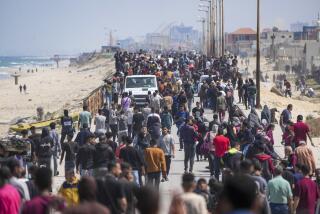Voters likely to revisit gay marriage
The recent run of states legalizing gay marriage -- punctuated Wednesday by Maine becoming the fifth state to do so -- has increased the likelihood that California voters will face another ballot measure on the issue as early as next year, according to strategists on both sides.
The California Supreme Court is expected to uphold Proposition 8, November’s ballot measure banning same-sex marriage, with a decision coming in the next few weeks. Both sides are already gearing up for another political campaign likely to come in 2010.
As recently as a few months ago, some gay activists feared 2010 would be too soon. But the fact that same-sex marriage is now legal in five states, with New York, New Jersey and New Hampshire poised to follow, has changed the political climate, they say.
“There is no doubt we are witnessing an enormous and unprecedented sea change in both public opinion and momentum on the issue of marriage equality,” said Kate Kendell, executive director of the National Center for Lesbian Rights. “I believe the electorate nationally and in California is in a different place when it comes to marriage equality than it was six months ago.”
Frank Schubert, who ran the Yes on 8 campaign in California, said the decisions in New England and Iowa gave same-sex marriage activists a boost.
But Schubert said the battle is far from over: Voters in Iowa and Maine might overturn those decisions. And helping to persuade them might be none other than Schubert himself, who is advising a national group on how to copy California’s defeat of same-sex marriage.
“There’s no doubt the other side is going to try to make great hay out of Iowa and Maine . . . but none of those places are California. And California voters have now twice voted on this,” he said. “What part of ‘No’ don’t they understand?”
In 2000, as the gay and lesbian rights movement pushed for rights for couples, California voters approved Proposition 22, an initiative that defined marriage as being only between a man and a woman. In a landmark ruling last May, the California Supreme Court threw out that law, making the state the second in the nation after Massachusetts to allow same-sex marriage.
An estimated 18,000 gay and lesbian couples married before Nov. 4, when Proposition 8 amended the state Constitution to once again outlaw the practice.
Amid massive protests and demonstrations after the election, California was once again on the front lines of the culture wars. But in the last six months, several other states have stepped into the spotlight.
The Connecticut Supreme Court in October decided to allow same-sex couples to wed. Then, taking many by surprise last month, the Iowa Supreme Court said the state’s same-sex marriage ban was unconstitutional, citing the California high court’s May 2008 ruling in its decision. Days later, Vermont allowed same-sex marriage. The New Hampshire Legislature authorized a similar bill Wednesday and the Democratic governor is weighing whether to sign it. Lawmakers in New York and New Jersey are considering bills of their own.
“The more states that come on board, the more people in California wonder, ‘What did we do here?’ ” said Marc Solomon, the newly hired marriage director for Equality California. “Are gay couples in Bangor, Maine, and Dubuque, Iowa, really going to be marrying when people in Pasadena can’t?”
Wednesday afternoon, Equality California announced it was launching a massive grass-roots campaign that seeks to reach 300,000 voters in the next 100 days.
Jon Davidson, legal director for the gay- and lesbian-rights group Lambda Legal, cited several recent polls that show public support for gay marriage rising. He also pointed to the flap over Miss California USA Carrie Prejean, whose opposition to same-sex marriage became an issue in her unsuccessful quest to become Miss USA -- and propelled her into cable-news fame and anti-gay-marriage advertisements.
“What a change, that there would be a controversy about a beauty pageant participant saying that she believed marriage should be between a man and woman,” Davidson said.
Many same-sex marriage activists say they hold a slim hope that the changes in other states might influence the justices on the California Supreme Court as they weigh legal challenges to Proposition 8.
But if the court upholds the ban as expected, the developments in Iowa and Maine are already shaping political tactics.
The Saturday after the court rules, for example, activists plan to hold a massive rally in Fresno featuring actress Charlize Theron. “The battle for equality has to be fought in Middle America -- in places like Fresno, California -- not just in gay-friendly cities like San Francisco and Los Angeles,” the Courage Campaign said in an e-mail to supporters Wednesday.
The group’s chairman Rick Jacobs said in an interview, “People see the possibility of winning places like Fresno, because of what we’re seeing across the country.”
But opponents are gearing up too.
Within hours of Maine Gov. John Baldacci becoming the first governor to approve a same-sex marriage bill without a court ruling, Michael Heath, executive director of the Maine Family Policy Council, began working to gather signatures for a so-called People’s Veto. A law in Maine allows voters to overrule the Legislature. Same-sex marriage could be on the ballot in Maine by November.
And just as voters here may be influenced by what other states have done, Heath said he expects Maine to be influenced by California: “The fact that Prop. 8 passed has been a source of encouragement.”
--
jessica.garrison@latimes.com
maura.dolan@latimes.com
More to Read
Start your day right
Sign up for Essential California for news, features and recommendations from the L.A. Times and beyond in your inbox six days a week.
You may occasionally receive promotional content from the Los Angeles Times.







